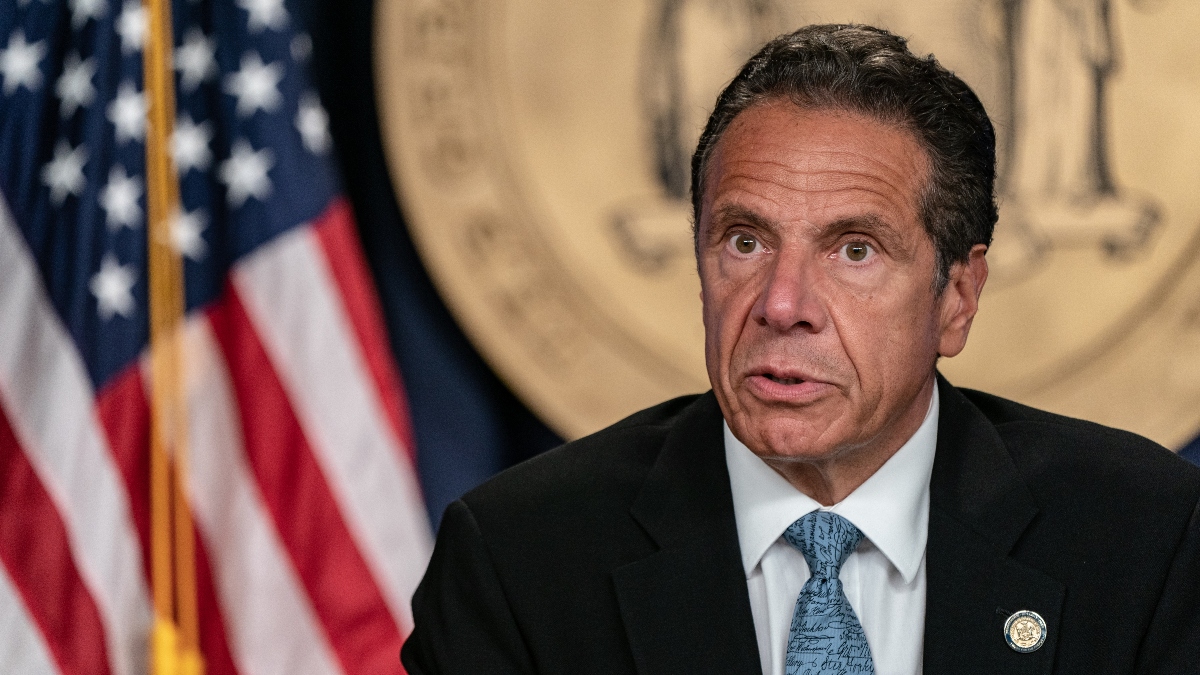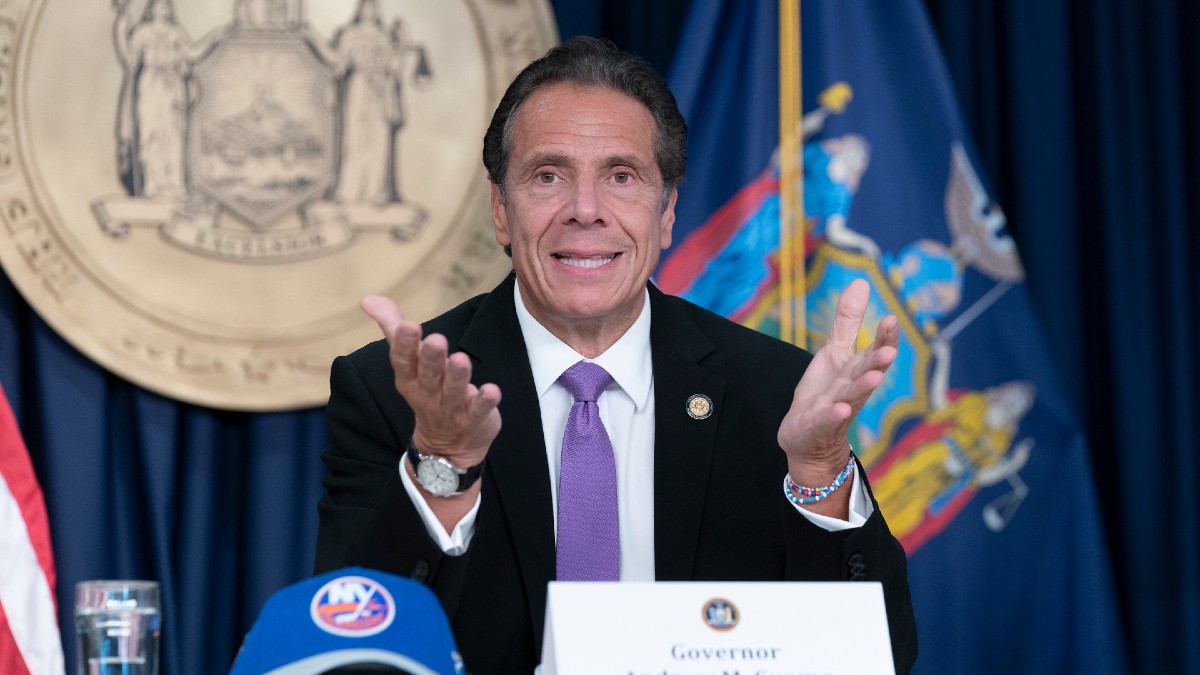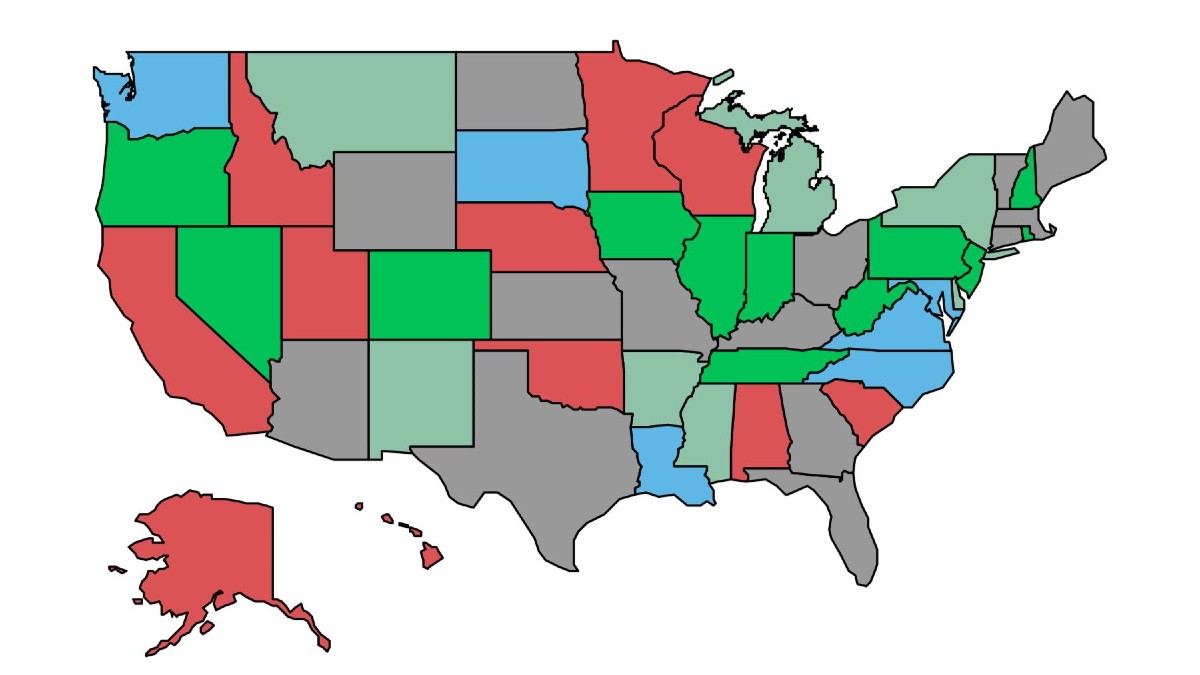
Jeenah Moon/Getty Images. Pictured: New York Gov. Andrew Cuomo.
2020 sports betting handle, revenues and taxes have all blown by 2019 totals, even though virtually all the world’s sports leagues were shut down for several months this spring due to the COVID-19 pandemic.
That was because several new state markets launched, plus shuttered leagues restarted during the summer and fall, pushing record-setting month after record-setting month in multiple states and across the country to finish out the year.
To keep the momentum going, it will take the continued success of remote, mobile wagering in new and existing states, along with sound policies that permit a competitive marketplace and easy access for customers.
Sports Betting Records Sets
Legal sportsbooks have already taken in more than $17 billion in wagers this year, even before complete November and December totals have been reported. That massive handle total includes more than $1.2 billion in operator revenues, which has subsequently generated roughly $188 million in government taxes.
These are major jumps from 2019, the first full year with legal, single-game wagering outside Nevada. Last year, sportsbooks accepted roughly $13 billion in bets, generating a little under $1 billion in revenues and $126 million in taxes.
New Jersey took Nevada’s crown as the highest-grossing state market once major American sports leagues began resuming seasons, topping the nation’s gambling hub in June handle, $165 million to $78 million. Since then, New Jersey has increased its handle each month, and set the all-time, single-month record for any state with $931 billion in November.
The Garden State’s eye-popping totals were joined by impressive growth in some of the nation’s newest markets:
- Colorado, which took its first bet May 1, has also increased its handle in every month since it went live, hitting $231 million in November, good for fifth-best of any state during that time.
- Tennessee, which took its first bet on Nov. 1, recorded $131 million last month, good for sixth among all states and the highest first-month total in U.S. sports betting history.
- Illinois, which took its first retail bet in March and first online bet in June, took in $434 million in October, the last month it has reported wagering data. It’s expected to be at or above that figure when November totals are released.
For the year so far, New Jersey ($5 billion in total 2020 handle) and Nevada ($3.75 billion) are joined by third-place Pennsylvania ($3 billion), fourth-place Indiana ($1.45 billion) and fifth-place Illinois ($941 million). Not coincidentally, all five of these states permit multiple operators and allow statewide mobile wagering.
Limited Markets Fall Behind
The top-five highest-grossing markets, plus No. 6 Colorado (roughly $900 million in total 2020 handle), No. 7 Iowa ($470 million) and No. 8 West Virginia ($345 million) all have multiple leading sportsbooks to choose from, including FanDuel, DraftKings and William Hill. Once registered, eligible bettors physically within these respective states can place a bet anywhere within state lines.
That is not the case in Mississippi (No. 9, with $308 million in handle), which only allows betting within physical casinos. No. 10 New Hampshire ($240 million), No. 11 Rhode Island ($200 million) and No. 12 Oregon ($191 million) allow statewide mobile wagering, but only allow one legal online sportsbook apiece.
Not surprisingly, Delaware and Arkansas, which only allow in-person betting, were the bottom two among the 17 municipalities that reported handle in 2020.
Population plays a major factor in the more lucrative states’ success, but self-imposed limitations on a competitive market can be a major additional handicap. Even with legal sports betting’s tremendous growth in 2020, analysts estimate the legal market is still less than 10% of the combined handle from illegal and offshore offerings.
Key Decisions Could Make or Break 2021
Five states have already passed laws to take bets as early as next year, and another dozen could take up legislation to do so in 2021, meaning the new year will almost assuredly top 2020’s handle, revenue and tax totals. To keep the end of this year’s breakneck pace, it will require sound decisions by the elected officials responsible for the next wave of states set to go live.
Virginia and Michigan will both take their first legal online sports bets sometime in the next few weeks. Each will have about a dozen, statewide mobile operators, positioning both to be among the nationwide leaders by the end of 2021.
Voters in Maryland, Louisiana and South Dakota all approved wagering on their respective 2020 ballots, but it will now be up to lawmakers in each state to determine how — and when — wagering begins. Maryland seems like a lock for statewide mobile betting, but it may limit participation to just a handful of operators. Louisiana and South Dakota are virtually assured to allow their respective retail gaming facilities to take bets, but it remains to be seen if they’ll permit online betting.
Meanwhile, Iowa is already set to sunset its in-person registration requirement for mobile betting next week, a move that could quickly spur greater operator (and customer) participation for the legal market. Illinois’ similar in-person requirement is set to carry through the end of 2021, but Gov. J.B. Pritzker seems poised to perpetuate the executive order that allows mobile registration, especially after his state’s massive revenue success in 2020.
And, perhaps most critical to the market overall, New York is set to once again consider statewide mobile betting. What has been a politically futile endeavor for several years now seems to have new life as the state faces a multibillion-dollar budget deficit and an April 1 deadline to rectify it. Mobile betting with remote registration would quickly take New York from an afterthought in national sports betting to an industry leader, pushing the U.S. betting handle to new heights even quicker than before.
All this comes as at least a dozen states will consider new sports betting measures of their own. A few more states with multi-operator markets, mobile registration and statewide access, combined with the continued success of the existing and pending launches, could help the incredible 2020 progress be just part of even greater growth for years to come.

